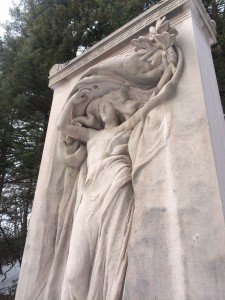Our tour guide at Orchard House, the Alcott family home, was right. She’d told us how Louisa’s sister, May, an accomplished artist, had been approached by the mother of a local boy who, from a young age, was putting knife to potatoes to carve figures, and who seemed to possess a native talent for sculpting. Would May, she wondered, be willing to take the boy under her wing and teach him what he might be willing to learn? The answer was yes.
That boy, Daniel Chester French, became, by the first decades of the 20th century, one of America’s leading sculptors. The Minuteman statue we saw adjacent to the North Bridge in Concord was his, completed for the 100th anniversary of the April 19, 1775 skirmish between British Regulars and Colonial Militia and Minutemen that sparked the war for independence. And in 1922, he collaborated with architect Henry Bacon to create one of our nation’s best known works: the Lincoln Memorial.
Our guide had said we could see an exquisite example of French’s work at the Sleepy Hollow Cemetery in Concord, a memorial to three brothers lost in the Civil War. It was, she said, an extremely moving work, and perhaps the piece most beloved by French himself. And so we went.
Mourning Victory is the name French gave his angelic, female figure, resolute and half clothed, who appears to be walking out of the stone, a victory bouquet of laurel leaves thrust outward in her left hand, while above her head her right hand pushes upward the folds of a shroud, as if to say, “death may have its day, but the final victory belongs to life.”
Standing in the snow in front of her I was deeply moved, and as I began reading the memorial attribution incised in stone below her, I had to stop. Why the tears? Was it because this memorial was dedicated by the surviving brother, James Melvin, to the three brothers lost in the Civil War, and as one of six brothers myself, I could intuit what such a loss might mean? That was part of it, I think. Was it because James Melvin had commissioned the sculpture from his boyhood friend, Daniel Chester French? This, too, I found significant. But it was the work itself that spoke most eloquently to me. Even now as I write more tears, unbidden, come.
Mourning Victory. Resolute strength wrapped in vulnerability. French has caught her in midstride, as if she’s about to leave the monument—and death itself—behind forever and stride into the light of that Bright Day. Inscribed at her feet, these words:
In memory of three brothers born in Concord
who as private soldiers gave their lives
In the war to save the country
This memorial is placed here by their surviving brother
himself a private soldier in the same war
“I with uncovered head
salute the sacred dead
who went and who return not”

